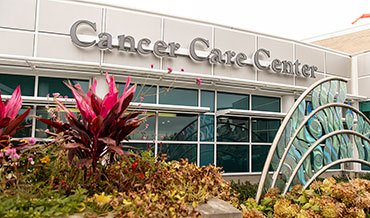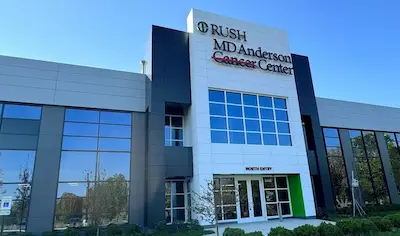The Approach to Gynecologic Cancer Treatment at RUSH MD Anderson
Gynecologic cancer treatment, also called gynecologic oncology, is a specialized type of care for cancers of the female reproductive system. At RUSH MD Anderson Cancer Center, our expert team is trained to treat these complex cancers — including cervical cancer, ovarian cancer, uterine and endometrial cancer, vaginal cancer and vulvar cancer — using some of the latest and personalized treatment options.
Whether your care involves surgery, chemotherapy, radiation, targeted therapies or a combination of treatments, your dedicated gynecologic oncologist will lead and coordinate every part of your care. Your team of providers will work closely together to provide expert, compassionate treatment focused on what matters most to you.
And while your team focuses on treating your cancer, they will also prioritize your quality of life — fertility and sexual health whenever possible, during treatment and after.
What Are Gynecologic Cancers?
Gynecologic cancers are cancers that start in a woman’s reproductive organs. These can include the uterus, ovaries, cervix, vagina and vulva. While each type is different, they all begin in areas of the body that play a role in your reproductive health.
The most common types of gynecologic cancer include:
- Endometrial cancer, or uterine cancer, cancer of the lining of the uterus (called the endometrium). This is the most common gynecologic cancer in the U.S.
- Ovarian cancer, which starts in the ovaries, where eggs and hormones like estrogen are made.
- Cervical cancer, cancer of the cervix, the lower part of the uterus that connects to the vagina.
- Vaginal cancer, a rare cancer that begins in the vagina, the canal leading from the uterus to the outside of the body.
- Vulvar cancer, cancer of the outer part of the genitals, called the vulva.
Diagnosing Gynecologic Cancers
Getting the right diagnosis is the first step toward the right care. If you’re having symptoms like unusual bleeding, bloating or pain, schedule an appointment with your gynecologist or primary care doctor.
During this appointment, your doctor may start by asking questions about your health history and performing a pelvic exam. If they find anything concerning, your doctor may order more tests or refer you to a gynecologic oncologist — a doctor who specializes in cancers that affect the female reproductive organs.
Depending on the type of cancer your doctor suspects you have, the diagnostic tests may vary. Some of the most common tools used to diagnose gynecologic cancers include:
- Imaging tests, like ultrasound, CT scan, MRI or PET scan, to look inside your body and check for tumors.
- Biopsy, which removes a small sample of tissue to check for cancer cells.
- Colposcopy, which uses a lighted, magnifying device to closely examine the cervix, vagina or vulva.
- Endoscopy, which uses a thin, flexible camera to look inside the uterus or other organs.
These tests help your doctor understand not just whether cancer is present, but also how far it may have spread, or what is called staging. Knowing the stage is important for choosing the best treatment plan for you.
Treatments Options for Gynecologic Cancers
If you’re diagnosed with a gynecologic cancer, your doctor will recommend seeing a gynecologic oncologist. They will work with you to create a treatment plan that’s right for your body, cancer type and needs.
Your treatment plan will depend on where the cancer started and how far it has spread. Some women may only need one type of treatment, while others may need a combination. Your care team will walk you through your options and explain what to expect.
Common treatments for gynecologic cancers include:
- Surgery, to remove the cancer. Many of our surgeries are minimally invasive, like laparoscopic or robotic surgery, which means smaller incisions, less pain and faster recovery.
- Chemotherapy, which kills cancer cells or stops them from growing. It can be given through an IV, as a pill or both.
- Radiation therapy, which involves high-energy beams that target and destroy cancer cells.
- Targeted therapy, which involves medicines that focus on specific changes in cancer cells and may cause fewer side effects than traditional chemotherapy.
- Immunotherapy, which involves treatments that help your body’s immune system recognize and attack cancer.
- Clinical trials, which give you access to promising options not yet widely available.
Second Opinions for Gynecologic Cancers
Have you been diagnosed with cancer? Consider a second opinion from RUSH MD Anderson. A second opinion can help you explore all your options and begin treatment with confidence and clarity.
RUSH MD Anderson offers easy access to second opinions, including free virtual intake visits with our knowledgeable nurse navigators for anyone in Illinois.
FAQs on Gynecologic Cancers
Symptoms can be different for each person and each type of gynecologic cancer. But common signs can include unusual vaginal bleeding or discharge, bloating, feeling full quickly, pelvic or belly pain, and changes in bathroom habits like needing to go more often or constipation. Itching, burning or changes to the skin of the vulva can also be signs. If something doesn’t feel right for you, talk to your doctor.
Gynecologic oncology involves diagnosing and treating cancers of the female reproductive system. This includes treatments like surgery, chemotherapy and other advanced therapies. General gynecology involves routine care, like annual exams, Pap tests and managing common issues, such as fibroids or heavy periods. If your doctor thinks you have or you’ve been diagnosed with a gynecologic cancer, they’ll refer you to our gynecologic oncology team for specialized care.
Yes, many gynecologic cancers can be treated with minimally invasive surgery, usually using laparoscopic or robotic-assisted techniques. This typically means smaller incisions, less pain and a quicker recovery. Whether it’s an option for you depends on the type and stage of your cancer. Your provider can walk you through the safest and most effective approach for your situation.
At RUSH MD Anderson, we know that cancer care goes beyond just medical treatment. That’s why we offer a wide range of emotional and psychological support through our Supportive Oncology program. This includes access to a group of experts, who specialize in helping people cope with the stress, anxiety and life changes that can come with a cancer diagnosis.
We also offer a program called the Gynecologic Empowerment for Menopause and Sexual Health (GEMS) clinic. It’s a collaboration between our Supportive Oncology and Gynecology teams, created specifically for people with gynecologic cancers. Located in the Joan and Paul Rubschlager Building, the GEMS clinic focuses on helping you navigate changes related to menopause, intimacy and sexual health.
We offer access to a variety of clinical trials for gynecologic cancers, including those studying new immunotherapies and targeted treatments. If interested, check out our clinical trials webpage or talk with your provider about trials that might be right for you.
Side effects vary depending on your treatment, but your doctor will work closely with you to help manage them. From medications to supportive therapies, there are ways to ease your symptoms.
After treatment, you’ll continue to be followed closely, often for several years, to check how you’re doing and monitor any changes. Your follow-up care will be tailored to your specific cancer type and stage.
RUSH MD Anderson Excellence in Gynecologic Cancer Treatment
- Leaders in research and clinical trials: As a principal member of the National Cancer Institute’s Gynecology Oncology Group, we’re leading the way for gynecologic cancer care and research, offering advanced treatments — such as innovative drug and radiation therapies and minimally invasive, robotic surgery — and exploring ways to detect gynecologic cancers in their earliest stages when they are most treatable.
- Expertise in advanced-stage and recurrent gynecologic cancers: At RUSH MD Anderson, we're able to use precision oncology to give you more options if you have advanced or recurrent cancer. We do this by partnering with Tempus — a biotechnology company that collects, stores and analyzes genetic data, clinical information and tissue samples. These tests can uncover treatment options, such as immunotherapies, if you have an advanced-stage or recurrent gynecologic cancer that hasn't responded to other treatment.
- Care where and when you need it: We make it easy for you to get care close to your home. Our gynecologic oncologists see patients at a number of convenient locations in Chicago, Aurora/Fox Valley, Oak Park and throughout the suburbs.
- Guiding you through survivorship: We know the physical and emotional stress of cancer doesn’t just go away after your last treatment. Our gynecologic cancer survivorship clinic helps arm you with the information and support you need to help with this transition. We’ll help coordinate follow-up appointments, discuss symptoms to pay attention to and work with you to address any other personal challenges. We also offer a program called the Gynecologic Empowerment for Menopause and Sexual Health (GEMS) clinic. It’s a collaboration between our Supportive Oncology and Gynecology teams, created specifically for people with gynecologic cancers, helping you navigate changes related to menopause, intimacy and sexual health.











